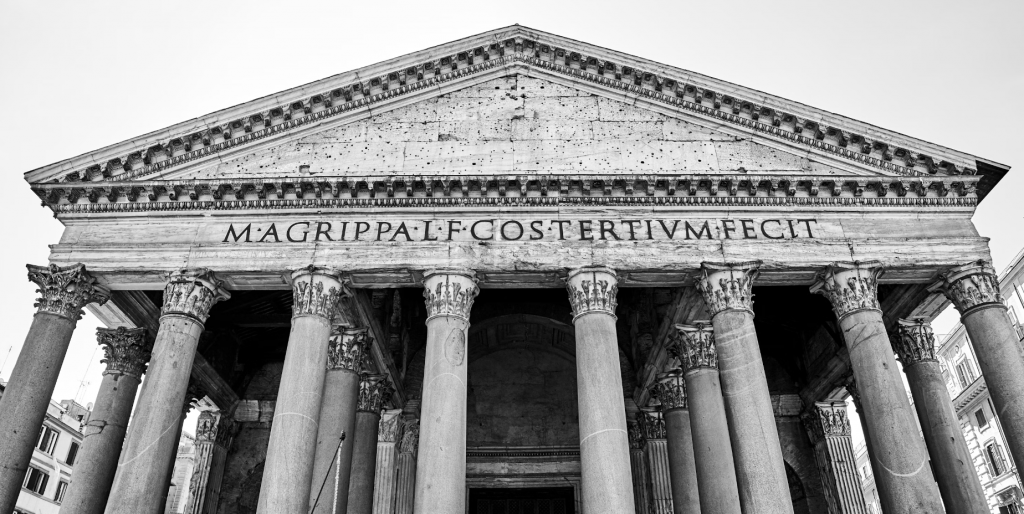The proclamation that Jesus is Lord was intolerable for Rome, which proclaimed that true peace could only be found in allegiance to the Roman Emperor—the Pax Romana. It is likewise intolerable today for those who proclaim that true peace can only be found in allegiance to the secular caricature that has become American so-called “democracy”—the Pax Americana. Heidi Przybyla, reporter for Politico, recently went on MSNBC to proclaim the gospel of apostate America. She warned of the rise of Christian nationalism saying,
[T]he thing that unites them as Christian nationalists [is] that they believe that our rights as Americans and as all human beings, don’t come from any earthly authority. They don’t come from Congress, they don’t come from the Supreme Court, they come from God.[3]
Yes, and Amen. Of course, Przybyla’s perspective that these notions are radical depends upon either willful ignorance of our nation’s history and the history of political thought, or upon her commitment to subverting the foundations of American government while pretending to be its defender.
Indeed, the very notion of a representative government by the people, for the people, was itself the fruit of Christian theology. Samuel Rutherford, the Scottish Presbyterian minister, in his book Lex Rex (which means the law is king) laid out the biblical case that all rulers are subordinate to God and his law, and legitimate ruling authority is established with the consent of the governed. Rutherford died of natural causes in 1661 just before his planned execution for promoting these ideas, which challenged the notion that kings possess an absolute divine mandate to rule.
Following the likes of Rutherford, the American framers understood, as James Madison said in Federalist no. 43, “[T]he transcendent law of nature and of nature’s God… declares that the safety and happiness of society, are the objects at which all political institutions aim, and to which all such institutions must be sacrificed.” As Thomas Jefferson, hardly the devout Christian, penned in the Declaration of Independence, “We hold these truths to be self-evident, that all men are created equal, that they are endowed, by their Creator, with certain unalienable rights, that among these are life, liberty, and the pursuit of happiness.” The very basis for declaring independence came from the conviction that all people are of “separate and equal station to which the Laws of Nature and Nature’s God entitle them.” Government exists “to secure these rights, deriving their just powers from the consent of the governed” and, therefore, “whenever any Form of Government becomes destructive of these ends, it is the Right of the People to alter or to abolish it.”
What Przybyla suggests are radical and dangerous ideas, the unanimous consent of the States declared “self-evident.” With one voice, our framers understood that the only sure protection against tyrannical rulers, precisely because wicked men can do greatest damage from within the halls of power, is for ruling authority to be separated among many states and branches of government. Governance that leads to flourishing for all people depended upon political authorities understanding that they are servants, subordinate to the will of their own people and duty bound to pursue their good above all other concerns, precisely because this is the will of God. It is as the apostle says in Romans 13: “For there is no authority except from God [and rulers] are God’s servant[s] for your good. [A ruler] is the servant of God, an avenger who carries out God’s wrath on the wrongdoer. For because of this you also pay taxes, for the authorities are ministers of God, attending to this very thing” (13:1, 4, 6).
Heidi Przybyla speaks not as a political commentator, but as an apostle of the demonic lie of secularism, which is nothing other than political polytheism. Rights, in her mind, comes from earthly lords, much like god-king Augustus—Congress and the Supreme Court. If this were the case, rights would be a paper construct with no basis in transcendent reality. If our rights are not grounded in an unchanging, eternal Reality, those rights are nothing more than privileges handed down by ruling elites—rights that can just as easily be taken away. As we have seen, when government abandons its task in bearing the sword against evil as God defines it, evil begins to prevail in increasing measure, with lawlessness and bloodshed becoming the norm as the innocent cry out to deaf authorities for relief.










